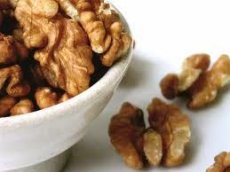Medical expert of the article
New publications
Moderate consumption of walnuts reduces the risk of breast cancer
Last reviewed: 30.06.2025

All iLive content is medically reviewed or fact checked to ensure as much factual accuracy as possible.
We have strict sourcing guidelines and only link to reputable media sites, academic research institutions and, whenever possible, medically peer reviewed studies. Note that the numbers in parentheses ([1], [2], etc.) are clickable links to these studies.
If you feel that any of our content is inaccurate, out-of-date, or otherwise questionable, please select it and press Ctrl + Enter.

Scientists from Marshall University (USA) have found that the risk of breast cancer is significantly reduced when the usual diet contains a moderate amount of walnuts. However, so far this has only been established for mice.
A walnut diet alters the activity of multiple genes linked to breast cancer in both mice and humans.
In the study, the researchers compared the effects of a normal diet and a walnut diet on the life of one generation of rodents - from conception to weaning and then self-feeding. The amount of nuts in the diet was equivalent to 55 grams per day for a human. The mice were genetically programmed to develop cancer.
The results of the experiment showed that the "nut" group at both stages developed breast cancer twice less often than those who ate regular food without nuts. In addition, the representatives of the first group developed fewer tumors and they were not large. In short, the scientists managed to reduce the risk of cancer even in GM animals.
Using genetic analysis, the researchers found that a walnut diet altered the activity of multiple genes linked to breast cancer in both mice and humans. Other tests showed that increased omega-3 fatty acids in the diet were not the only reason for the anti-cancer effect: Tumor growth slowed when the rodents consumed more vitamin E.
Experts emphasize that nutrition plays a vital role in health. What we eat affects the body's functions, its response to illness, and overall health.


 [
[